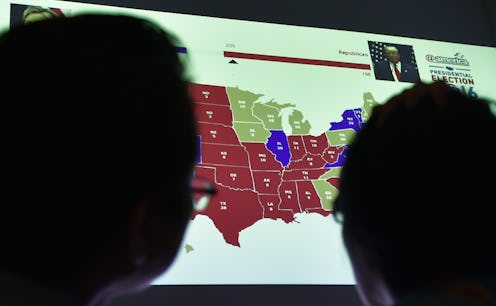News
Which States Have Electoral College Voting Laws?
On Dec. 19, electors in 50 states and Washington, D.C. will convene to vote for the president. Their votes will then be officially counted and read into the congressional record on Jan. 6. If all goes normally, Donald Trump will receive 306 electoral votes, for the 30 states he won, along with one extra vote for Maine, which allocates its electoral votes individually by district, and Hillary Clinton will receive the remaining 232 votes, for the 20 states she won, plus Washington D.C. But what if things don't go as expected? Do state have Electoral College voting laws?
A group called the Hamilton Electors is arguing that electors should vote their conscience and not the way their state voted. Their ideology is centered on interpreting the original intent of the Electoral College from Alexander Hamilton, which, they argue, proves its purpose is to prevent America from being taken over by an unqualified demagogue (like Trump, they believe). The Hamilton Electors' website states:
The Founding Fathers intended the Electoral College to stop an unfit man from becoming President.
The Constitution they crafted gives us this tool.
Conscience demands that we use it.
Together, we can stop Trump when the Electoral College votes on December 19th.
And there are already several electors joining the fight.
But stopping those electors from voting against Trump isn't easy. According to Ballotpedia, a non-partisan online encyclopedia on elections that looked at the electoral laws of all 50 states, 30 states (and Washington, DC) have laws binding their electors to vote for the winner of the popular vote in that state. The remaining states have no such law.
At this point, none of these laws binding electors to vote with the results of their state have ever been prosecuted in court. So, we don't know how binding they would be — if an elector voted their conscience, would the law force them to change back to how their state voted?
Of course, the presence of a law binding electors is only relevant in the 31 states where Trump won at least one electoral vote. There are 15 states Trump won where electors are free to vote however they like. And there are 16 (counting Maine) where electors are bound to vote with their state.
But perhaps even tougher than convincing electors to break precedent and vote against their state, is convincing electors that Trump is bad. Electors are usually chosen by state parties — and they're almost always supporters of the candidate they're voting for. Trump's opponents in the states he won spent months unable to convince voters of his terribleness, unsuccessfully. To convince enough Republican electors to change ranks and ditch Trump now seems even more insurmountable than challenging a 200-plus-year-old system.
